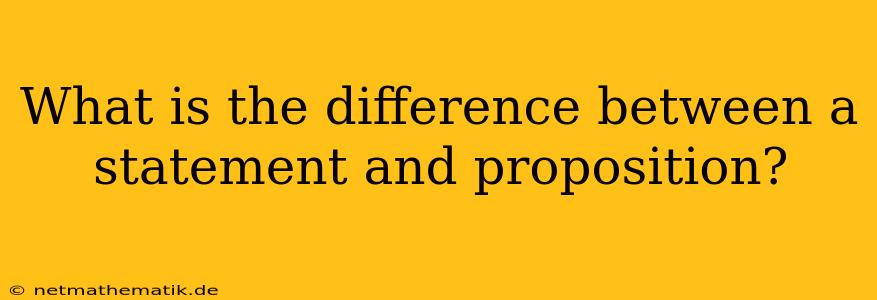The terms "statement" and "proposition" are often used interchangeably, but there are subtle differences between them. While both represent declarative sentences conveying information, their distinctions lie in their context, focus, and specific applications. Understanding these differences is crucial for precise communication and logical reasoning, especially in fields like logic, mathematics, and philosophy. This article will delve into the distinctions between statements and propositions, exploring their characteristics, examples, and applications.
Statements: Declarations of Facts and Opinions
A statement is a declarative sentence that expresses a fact, opinion, or belief. It can be true, false, or uncertain. Statements are common in everyday language and encompass a wide range of expressions, including:
- Factual statements: These express verifiable truths. For example, "The Earth is round."
- Opinion statements: These express personal beliefs or judgments. For example, "Chocolate is the best flavor."
- Hypothetical statements: These express possibilities or conditions. For example, "If it rains, I will stay inside."
Characteristics of Statements:
- Declarative form: Statements are typically expressed in declarative sentences with a subject and a predicate.
- Truth value: Statements can be assigned a truth value, either true or false, or sometimes unknown.
- Contextual dependence: The truth value of a statement can vary depending on the context in which it is uttered.
Examples of Statements:
- The sky is blue.
- My favorite color is green.
- Dogs are mammals.
- The capital of France is Paris.
- The world will end tomorrow.
Propositions: Abstract Representations of Truth
A proposition is an abstract representation of a statement's meaning, focusing solely on its truth value. It is a fundamental concept in logic and is often defined as a declarative sentence that is either true or false, but not both. Propositions are typically denoted by letters like 'p', 'q', 'r', etc.
Characteristics of Propositions:
- Truth-functional: Propositions are evaluated based on their truth values, independent of their specific wording or context.
- Abstract entities: Propositions are not concrete entities; they are abstract representations of truth.
- Logical operators: Propositions can be combined using logical operators (e.g., AND, OR, NOT) to form complex propositions.
Examples of Propositions:
- p: The sky is blue.
- q: My favorite color is green.
- r: Dogs are mammals.
- s: The capital of France is Paris.
Key Differences Between Statements and Propositions
| Feature | Statement | Proposition |
|---|---|---|
| Nature | Concrete, specific declaration | Abstract, truth-focused representation |
| Form | Declarative sentence | Abstract symbol or formula |
| Context | Dependent on context | Independent of context |
| Truth Value | Can be true, false, or uncertain | Always either true or false |
| Focus | Meaning and context | Truth value |
Application and Importance
The distinction between statements and propositions is crucial in various fields:
- Logic: Propositions are the building blocks of logical systems, allowing for the construction and analysis of arguments.
- Mathematics: Mathematical theorems and proofs are often formulated using propositions, ensuring precise and unambiguous reasoning.
- Computer science: Propositions are essential in computer programming for defining truth conditions, implementing logical operations, and verifying program correctness.
- Philosophy: The concept of propositions plays a significant role in theories of knowledge, truth, and meaning.
Conclusion
Understanding the difference between statements and propositions is key to appreciating the nuances of language and logic. While statements express facts, opinions, or beliefs in a specific context, propositions abstractly represent truth values, serving as fundamental units of logical reasoning. Recognizing these distinctions allows for more precise communication and a deeper understanding of the complexities of human language and the structure of knowledge.
